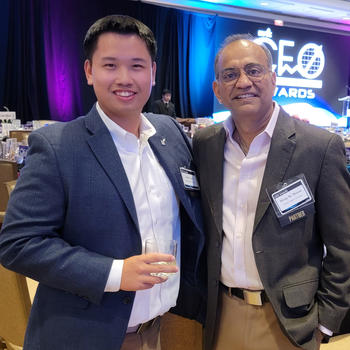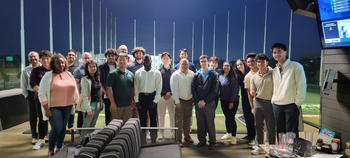In This Story
In a region loaded with industry giants and businesses of all sizes, the George Mason University School of Business offers experiential learning opportunities that gives students hands-on training with real projects at real organizations.
Beginning in the spring 2021 semester, the information systems and operations management (ISOM) area at the School of Business began its “Experiential Learning: Solving Business Challenges with Technology Solutions” course, giving students the ability to work on real technology and data analytical projects with actual industry participants (often referred to as clients) in search of solutions for their business challenges. The Experiential Learning (EXL) Program, developed and taught by Brian Ngac, PMP, C|CISO, CISSP, focuses on business process improvement, data analytics, and cyber security projects. “It’s more than a group project,” Ngac says. “It’s more than a class project. It’s real world experience that you can put on your resume which will set you apart from your peers.” The ISOM EXL program has two current offerings for students.
The first is an elective course titled “Experiential Learning: Solving Business Challenges with Technology Solutions” and is currently being offered as MIS 491. The three-credit course is currently open to students in the management information systems (MIS) and business analytics (BA) concentrations within the undergraduate business degree. To participate in this course, students must be recommended by one of their technical professors and receive a B or higher in their Systems Analysis & Design course–a class focused on business process improvement through technology solution integration. When participating in this course, students will spend 10 weeks working with their clients to understand their specific business challenges, architect a solution for those challenges, quantify to prove how and why their recommended solution will actually solve their client's business challenges and by how much, as well as provide an implementation roadmap for their recommended solution. The remaining five weeks are set aside for introductions at the beginning of the semester, as well as client and internal school presentations of the EXL effort and lessons learned. Through meeting with their clients and instructors on a weekly basis, it allows the students to quickly provide tangible progress and receive feedback periodically–which allows them to adjust to their client’s changing requirements. This is a core principle of the EXL Program to keep it agile, challenging, and relevant for both the students and the industry participants.

The second offering of the EXL Program is made possible because of the Commonwealth Cyber Initiative (CCI) and its grant awards. Back in June 2022, Ngac and one of his academic-career mentors–Nirup Menon, ISOM professor, were awarded the CCI Cyber Security Experiential Learning Grant worth $100,000, which was used to fund cyber security internships with multiple industry participants in the spring 2023 semester. In May 2023, a second $100,000 grant award from CCI will help provide an additional 24 cybersecurity-interested students (12 in the fall 2023 semester and 12 in the spring 2024 semester) with the opportunity to work directly with the CCI community and cyber industry partners through a paid 12-week part-time internship–allowing for a real-world, hands-on, and agile learning environment. The CCI grant allows the program to include students beyond the ISOM area, opening it up to students in Mason’s College of Engineering and Computing, as well as any student enrolled in a Virginia public higher education institution. To participate in the cyber security internship, students will apply as if they are applying for any other internship. The students’ resumes are then reviewed by Ngac and Menon before being further reviewed by the industry participants. The industry participants will then hold interviews for those students who pass the resume screen stage. Finally, students who pass the interview stages will be offered the cyber security internship with the industry participant who interviewed them. Those that are accepted as a cyber security intern through the EXL program will receive a $2,500 stipend from the grant, and the industry participants are required to match or exceed that financial support.
Unlike the first EXL offering, the cyber security internship requires the students to work with the clients for 20 hours per week during their 12-week part-time internship. This allows the students to truly experience an internship setting, resulting in even more benefits for the students and their industry participants. At the end of their internship, each intern team (grouped by industry participant) will create and give a presentation on their internship activities, experiences, and lessons learned to a group of academics and industry professionals. Moreover, specific to the cyber security internship program funded by the CCI grant, an event will be held in April 2024 where the cyber security interns, their industry participants, and other cyber professionals invited by Ngac will get together at Top Golf to network, eat, and play golf.

The Experiential Learning Program has seen tremendous results since its inception in spring of 2021. So far there have been 20 industry participants, organizations of varying sizes and from sectors ranging from real estate, defense contractors, non-profits, government agencies, and more. And from those participants there have been 24 projects, enabling students to offer real solutions, while being mentored in the process. This second consecutive grant focusing on cyber security brings in more participants and demonstrates how wildly successful the course has been run. “Many students have had job offers immediately following the experiential learning program from their industry partners or clients,” says Ngac. “For others, it’s a great resume booster. Everyone who I’ve seen graduate from the program has put it on their resume and has easily gotten a job.” Brian Ngac and Nirup Menon have found that the course’s early success has continued breeding success, as grants continue to be won, students keep applying, and industry participants eagerly sign on.
“I am very proud to see the Experiential Learning Program I’ve created impact over 70 of my students’ early careers. And I am very honored to have organizations like the Commonwealth Cyber Initiative recognize mine and Nirup’s hard work through the multiple grant awards which fund our students’ labor effort and very important networking events. I have big dreams of what this program can grow into in the coming years, and how much impact it can have not only in our students’ lives but also the industries we serve” Ngac says.
If you are interested in supporting the Experiential Learning program, please contact Brian Ngac at bngac@gmu.edu.
